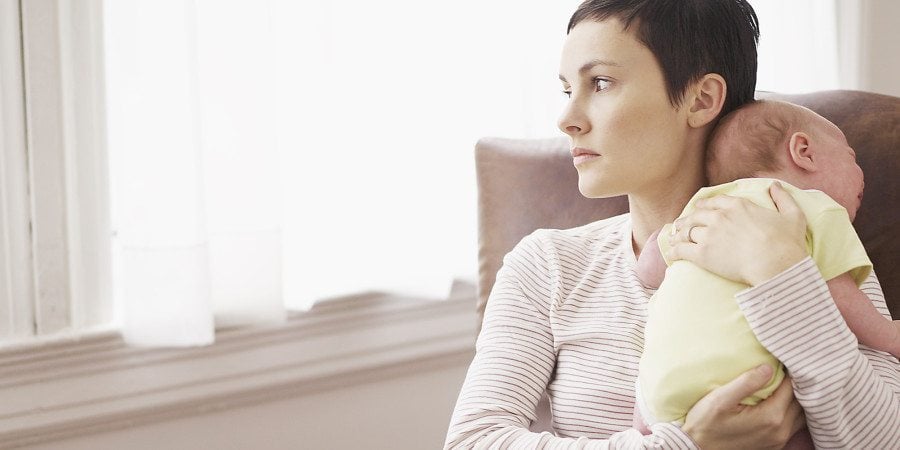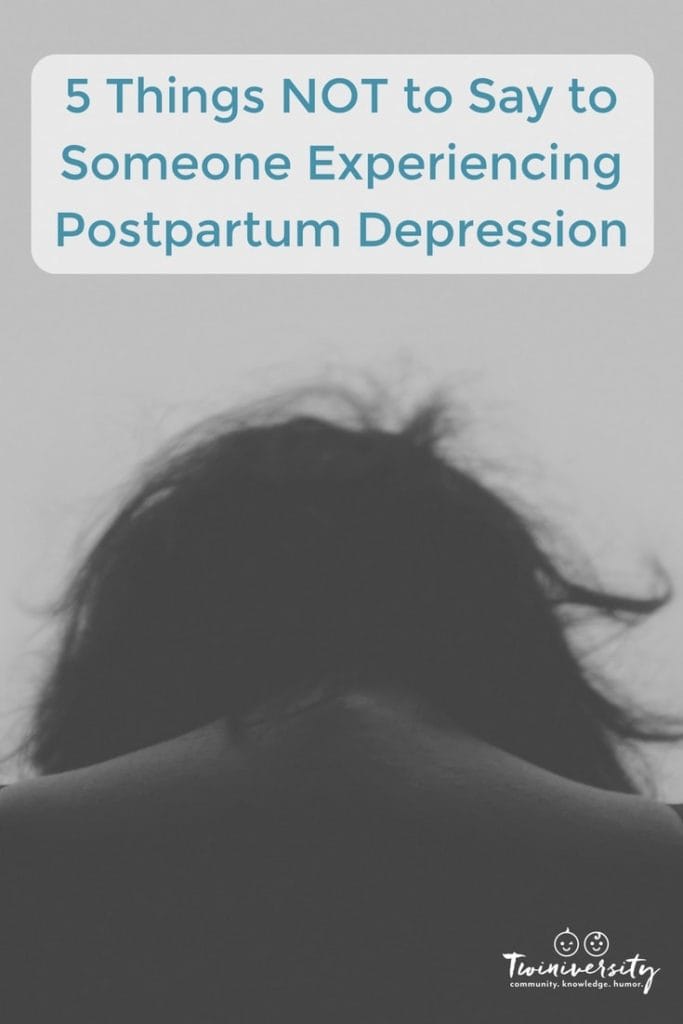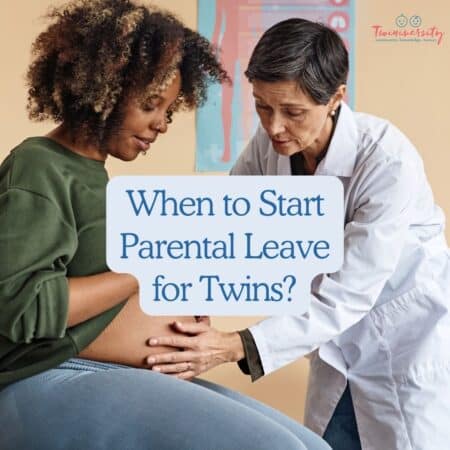Last updated on January 24th, 2024 at 08:31 pm
Read what this twin mom says are the 5 things you should NOT say to someone experiencing postpartum depression, plus 5 helpful things you SHOULD say.
Becoming a parent to multiples comes with so many challenges, and you will get well-intentioned advice from friends, family, and even strangers on how to parent your kids. When a parent is struggling, people will often try to find the right thing to say or some helpful advice to give, hoping they are making the person feel better or lifting their spirits. When it comes to experiencing postpartum depression, however, sometimes that advice can be unhelpful and downright hurtful.
Postpartum depression is not something a parent chooses to experience, and there isn’t a “quick fix” for those suffering from it. Being a positive support to a parent of multiples experiencing postpartum depression can make such a difference, and saying the right thing can help ease the parent toward healing.
Here 5 things NOT to say to someone experiencing postpartum depression:
1. You Have So Much to Be Thankful For!
You aren’t telling a new mother anything she doesn’t already know. She knows she has been blessed with two babies at once. She is thankful to have two babies to love. If she experienced infertility prior to having twins, as many multiple families do, she completely understands the gift she has been given. Which is why saying this as a reaction to postpartum depression is unhelpful for a mother to hear. It only adds to her guilt and confusion over feeling the way she does.

2. You Just Need to Get Out More
As any parent of multiples can tell you, even on the best of days this can be an incredible feat. Getting out of the house with two babies or toddlers can be a challenge on many days, and can feel daunting to someone experiencing feelings of anxiety and depression. While getting out alone can help improve your mood, it may not always be easy or feasible, as well. Babysitters are expensive, spouses may work long hours, and family may not be nearby to help.
3. It’s Normal – Everyone Feels That Way
While many women will experience some mood changes during the first few weeks after delivery (commonly called the “baby blues”), continuing to feel anxious and depressed long after your children are born can be debilitating. Yes, parenting multiples is stressful. Yes, becoming a new parent can cause some anxiety. But continuing to feel depressed, anxious, and overwhelmed is not good for mom’s health.
4. You’d Feel Better if You Exercised, Ate Better, Got More Sleep, Took This Vitamin, Etc.
With most of these suggestions, there’s no arguing that a person’s overall health will benefit. The problem lies within the notion that all a mother needs is to do these things to feel better, and that doing these things is easy. There are many pathways to healing from postpartum depression, including medication, therapy, spirituality, and natural remedies. What matters is that the mother obtains the help she finds most therapeutic to get on her path to wellness.

5. You Just Need to Push Through It/Get Over It
Unfortunately, we live in a culture that doesn’t always support or understand mental health issues. Telling a woman to “push through” her feelings of depression and anxiety is unsupportive, and dismisses postpartum depression as a significant health issue. postpartum depression is not something a woman can just “get over,” and telling her so will only make her feel as if she is at fault.
Here’s some things you might want to say instead:
1. I’m Sorry You Are Going Through This
Women experiencing postpartum depression often just want to be heard. They want to know someone is listening to them, not judging them, and is there to support them. You may not know what advice to give or what to do to help, but showing them you hear them shows you are there to support them.

2. I’m Going to Do _ For You. (fill in the blank with such things as bring you dinner, go grocery shopping for you, babysit, and visit, etc.)
So often you hear people say, “Let me know if you need anything!” or, “I’m here if you need me!” While this can show support for a new mother, taking it a step further by being explicit and specific about how you will help. Tell them a day you will bring a meal over. Set a date for coffee and conversation. Offer to babysit for an afternoon away or a date night on a specific day. Asking for and accepting help can be hard for moms, especially those experiencing postpartum depression, so showing you mean what you say and taking the lead can make a huge difference.
3. You Aren’t Alone
When in the throes of postpartum depression, mothers tend to feel like there’s no one else in the world that can possibly feel this way. According to Postpartum Support International, 15-20% of women experience significant symptoms of depression and anxiety following the birth of a child. Let her know she is not alone in feeling this way, and there are resources available to her to help her feel better.
4. You Will Feel Better in Time, and I Will Support You With Whatever You Need
Each woman’s recovery from postpartum depression will look different, but the important thing to know is that they can feel better in time. Support her in her journey to wellness. Babysit while she attends therapy, a support group, or a doctor’s appointment. Call in to check on her. Attend church or an exercise class with her. Let her know you are there alongside her as she heals.

5. You Are Not a Bad Mother
No one chooses to experience postpartum depression, and most women will feel intense guilt and worry over the way they are feeling. They wonder if experiencing postpartum depression makes them a bad mother. They worry others will judge them for how they feel. They are afraid their depression is affecting their baby. Having postpartum depression does not define a mother or make her a bad parent, it is simply a difficult part of her journey into motherhood.
If you or someone you know is experiencing symptoms of postpartum depression or anxiety, contact a local physician. You can also find support in your area by visiting Postpartum Support International.
All content on this Web site, including medical opinion and any other health-related information, is for informational purposes only and should not be considered to be a specific diagnosis or treatment plan for any individual situation. Use of this site and the information contained herein does not create a doctor-patient relationship. Always seek the direct advice of your own doctor in connection with any questions or issues you may have regarding your own health or the health of others.

Kathy Schommer is trained social worker and current SAHM to fraternal twin 2.5-year-old girls, June & Lucy. She is passionate about connecting with local moms, and serves as a Twiniversity Mentor, local play group organizer, and Support Coordinator for Postpartum Support International. In her spare time, she enjoys crafting, reading, and playing outside with her girls. She currently lives in Jacksonville, FL, with her family.







